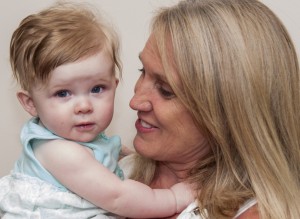
When Seattle Children’s Family Advisory Council opened nominations for the 2015 Family Choice Awards, patients and families responded with more than 200 names – each one belonging to a staff or faculty member who made an indelible impression for all the right reasons.
With great difficulty, the advisory council whittled down the nominations to select four recipients who live and breathe a commitment to family-centered care: Danielle Giles, Sherri Kruzner-Rowe, Jo Ristow and Dr. Kendra Smith. In addition, the graduating residents selected one of their peers – Dr. Amanda Stinger – for the family-centered resident award.
Read on to learn more about the 2015 Family Choice Award winners and what family-centered care means to each of them.
Danielle Giles, family service coordinator
“I went up to Danielle just to ask for a phone number of someone who could clear up some conflicting information, and she took the stress and frustration off my shoulders by making phone call after phone call until we got the answers we needed,” said Sandy Roberts, a parent of a patient.
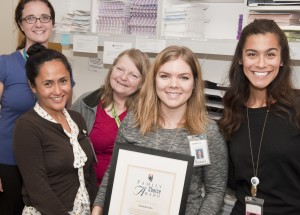
Giles has worked at Seattle Children’s for less than a year, but this place has been close to her heart since her little brother had open-heart surgery here a dozen years ago.
“The people here were so kind and welcoming, and nothing felt scary,” she recalls.
From where she sits today – at the Ocean 6 registration desk – she strives to give other families the same feeling. That sometimes means wading into complicated situations.
“I consider myself an advocate for families, and I’m willing to tackle whatever I need to on their behalf,” she said.
Sometimes at registration, families are stressed, frustrated and worried about their child. Giles tries to see the situation through their eyes.
“I find myself thinking, ‘what does this family really want or need right now, in this moment?’ Changing my perspective helps guide my actions,” she said.
Sherri Kruzner-Rowe, registered nurse, Cardiac Intensive Care Unit (CICU)
“Sherri listened and valued our opinion every day while we were in the Cardiac Intensive Care Unit…and she supported our family by including us as much as she could. How do you say thank you to someone who helped save your daughter’s life?” said Trinity Gossett, mother of patient Karissa Gossett.
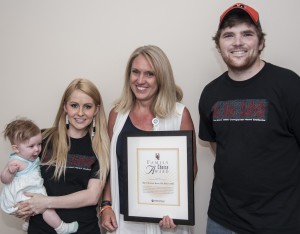
Kruzner-Rowe can’t remember a time when she didn’t want to be a nurse, like her mom. Once she entered the profession, she knew right away where she belonged: in the high-adrenaline, high-stress, high-stakes world of critical care.
“I never wanted a nice, quiet job,” said Kruzner-Rowe. “I’m a Type A personality and I have to be challenged.”
The CICU at Seattle Children’s delivers these challenges.
But she never forgets that beneath the tubes and wires and monitors in the CICU are babies, children and teens with individual personalities and unique needs – each with a loving family struggling through some of the hardest days of their lives.
“I don’t just take care of a patient – I take care of their parents, siblings and the rest of the family,” said Kruzner-Rowe. “I tell parents that it’s okay to ask me the same question 20 times – I’ll answer it every time. And I invite them to help bathe their children, change their bedding, hold their hands and do other things that bring some normalcy to their situation, which is anything but normal.”
Jo Ristow, speech pathologist, Seattle Children’s Autism Center
“Jo has made extraordinary progress with my son in just a few sessions. The twinkle in his eye and the ‘happy, happy, happy’ on his iPad speaks for itself,” said Victoria Montalvo, a mother of a patient.
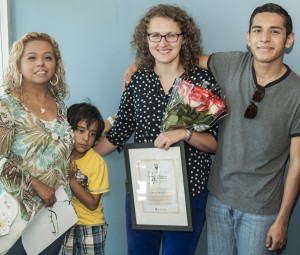
Ristow understands that kids are much more likely to engage in topics they’re interested in. That’s why she learns what fascinates her patients and goes out of her way to incorporate those interests into her sessions with them – from Korean reality TV, to oscillating fans, to the way her arms jiggle when she claps.
As a speech and language pathologist at Seattle Children’s Autism Center, Ristow helps children who are non-verbal use adaptive tools – like picture cards and iPads – to communicate. At the same time, she helps their families adjust to a different way of thinking about communication and connection.
The work can be heartbreaking and exhausting, but the payoff is exhilarating.
“There is something magical about the ‘Aha!’ moment when a child realizes they can communicate with another person,” said Ristow. “That moment is often accompanied by laughter, smiles and evident joy on the part of the child and everyone else present!”
Ristow keeps a journal of the good days to buoy her on the hard ones. The book is full of lessons, including this one, which she uses as a daily touchstone: “You don’t have to be able to talk perfectly to communicate empathy and humor and love and joy.”
Dr. Kendra Smith, physician, Neonatal Intensive Care Unit (NICU)
“From our very first day in the NICU, [Dr. Smith] was gentle yet straightforward in explaining procedures, risks and our options, and she went out of her way to translate medical terminology so we could better understand our daughter’s condition. We credit our daughter’s health today to her incredible leadership and talents,” said April McMurry, a mother of a patient.
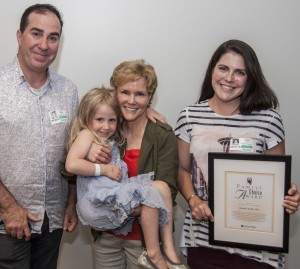
The first time Smith stepped into a NICU, she was entranced. “An emotion came over me when I saw tiny babies in their isolettes,” she recalls. “I decided at that moment that taking care of sick newborns was my passion in life.”
Today – 19 years into her career as a neonatologist – Kendra’s passion endures.
There is nothing more fulfilling to me than being with these babies and their families, despite the overwhelming difficulties they face,” she said.
Every day, Smith helps families navigate an unfamiliar medical terms, a dizzying array of high-tech equipment and life-and-death decisions for their child.
“At the end of every intense conversation I give the mother and father a hug and reassure them that we will help them move through this, and that I am envisioning the day they will be able to take their baby home,” she said.
The vision holds for even the sickest patients. Earlier this year, Smith and her colleagues found a dramatic and effective treatment, known as liquid ventilation, for a baby with only a sliver of hope for survival.
“Despite her poor prognosis, this baby beat the odds and is now growing and developing normally,” said Smith. “I have learned to never underestimate the amazing ability of babies to get better when they are surrounded by the love of their families.”
Dr. Amanda Stinger, Family-Centered Resident Award
“Amanda spends hours with patient families to make sure they feel heard and respected, and she advocates for patients and families who often don’t have a voice,” said Dr. Elizabeth Swedo, a pediatric resident, class of 2015.
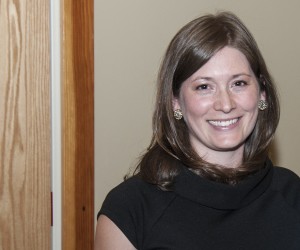
In July, Stinger completed her medical residency at Seattle Children’s: three years of on-the-job training filled with intense learning experiences. But one of the most important lessons came during her very first month.
“I was a terrified intern starting on the Medically Complex Child service, and one of my first patients was profoundly delayed and disabled from intractable epilepsy,” Stinger recalls.
Unsure about how to approach the patient, Stinger watched the child’s mom. “She talked directly to her daughter, played with her and tried to get her to laugh – just like you would with any other child,” said Stinger. “She encouraged me to do the same, and patiently guided me through the intricacies of her daughter’s capabilities.”
Stinger said the encounter left two lasting lessons that made her a better pediatrician. First, parents are the experts on their own children and usually have something to teach providers. Second, kids are kids; no matter their abilities or limitations, she can talk to them, play with them and treat them like children.
Stinger was selected for the Family-Centered Resident Award by her peers in the residency class of 2015. This August, she will join Skagit Pediatrics in Mount Vernon as a general pediatrician.

